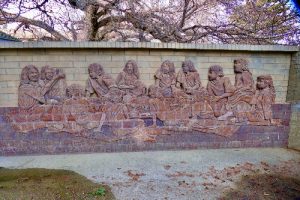HOMILY CORPUS CHRISTI SUNDAY
Living the Eucharist
(Deuteronomy 8:2-3, 14-16; Psalm 147; 1 Cor 10:16-17; Jn 6:51-59)
*****************************************************************
The famous Forest Lawn Memorial Garden in the state of Georgia is a huge marble carving of the Last Supper. Twenty feet long and seven feet high, it is carved out of a 60-ton block of white marble. It shows Jesus and the twelve apostles life-size. The sculptor carved details such as fingernails, and food on the table. It took him three years to carve out this memorial to the Holy Thursday event.

Last Supper by James Marshall
Closer to home is the Last Supper carved by James Marshal that is part of the Way of the Cross in Medicine Hat, Alberta. These works of art, and this feast of Corpus Christi, remind us that the best way to remember the Last Supper is to live it in our lives each day.
For St. Paul, and for Henri Nouwen, “remembering” is a very dynamic activity. It is far from static. Remembering the past, makes the past real in the present, and releases a power capable of carrying us into the future.
The most radical act imaginable is to give one’s life over to others. Jesus’ words as he breaks the bread and blesses the cup indicate his willing acceptance of what lies ahead, and a complete disowning of self. It is as if he lays no claim to his personhood, but has given himself to his followers – and by extension, to the world – in a total act of self-giving. Nothing is held back, not even his life’s blood. He is completely and utterly at the disposal of all. The catch is that he instructs us to remember him by doing likewise – not simply in breaking bread and sharing the cup, but in a self-giving that is modelled on his.
Each time we celebrate the Eucharist, then, we are agreeing to more than remembering Jesus. We are, in fact, participating in his covenant with our own bodies, our own blood. For his sake, we are agreeing to offer ourselves for the life of the world. For his sake, we are committing ourselves to a self-emptying so profound that it is his life that fills us, works through us and gives us life. The Eucharist is not just a one-sided gift to comfort and strengthen us, but a challenge to become Christ for the world, bread for the world.
The communion we share must be lived out, not just remembered. We must become the Body of Christ. That means being one with, and being broken for, others. We must be one body. The Eucharist is both symbol of and source of unity and oneness. That means being reconciled with all others and trying to live in harmony and unity and peace with our fellow human beings. We must also let ourselves be broken. That means apologizing, forgiving, and giving ourselves in service, seeking to do good for others without counting the cost or seeking gain.
The Jewish people were chosen to be a model of God’s plan for the world – union with God and one another. However, they failed because of their desire for possession, prestige and power like all the other nations. They failed because of their dependence on their own narrow notion of holiness and purity that separated them from others and created divisions among them. Jesus came into that society to establish the kingdom of God anew – a kingdom of compassion and justice as life-giving relationships. And that is what we are called to do every day – be transformed into love, into compassion and justice.
As a boy Fr. Basil Pennington worked for a local grocer. The owner was a good natured, gentle and happy man. It was a joy to work for him. Much was sold in those days by scoops and by cups. And his directions to Basil were clear: “Fill it all the way, boy; shake it a bit so that it settles well (no air pockets), press it some and then add a bit so that it overflows.” He had no idea then that his good employer was only following the Gospel: “Good measure pressed down, shaken together, running over.” And this grocer was a happy man, a witness to the last part of that teaching, “For the measure you measure with will be measured back to you.” His employer was living out the Eucharist, living out the Gospel, in his everyday actions.
To be thus transformed into love, compassion, unity and justice – that is what this Eucharist symbolizes and does for us – if we celebrate it with faith. May our sharing in this Eucharist today help us become one Body, one Spirit, and empower us to give ourselves in service to others so that we might truly live out the memorial we celebrate today.



